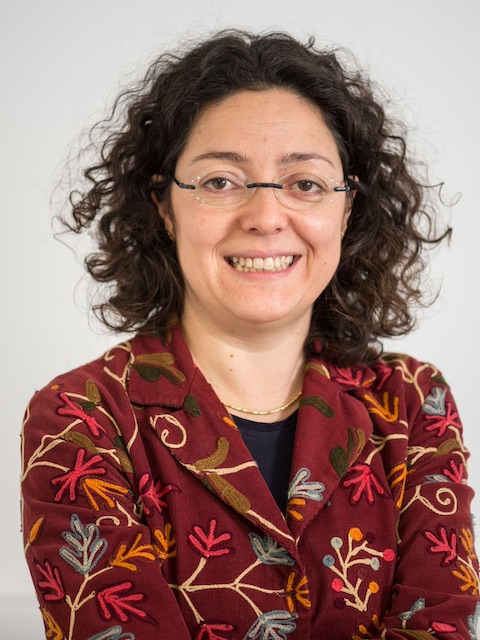Profile
Sara is a specialist in the area of integrable systems, a lively area of mathematics bringing together algebra, analysis and geometry to tackle fundamental problems often motivated by mathematical physics.
Her research has been supported by a wide range of funding bodies, both in pure and applied mathematics. She has received three fellowships, from the EPSRC, from the Netherlands Organisation for Scientific Research (NWO) and from the Irish Research Council for Science, Engineering and Technology (IRCSET).
Sara is a keen advocate of the role of mathematics in the society, and of the unique contribution that mathematical sciences bring to other STEM disciplines and to the economy. She believes that it is important to promote interdisciplinary research as well as to emphasise the importance of fundamental research.
Equally, she believes that embracing diversity – in all its aspects – is key to successfully tackle research challenges and ultimately to good science. This has driven her to work closely with the Institute of Mathematics and Applications (IMA), where she is a member of the Research Committee, as well as with the London Mathematical Society, as IMA representative in the Women in Mathematics Committee and member of the Good Practice Scheme steering group. Sara has led many Equality, Diversity and Inclusion initiatives, both nationally and internationally. She occasionally chairs panels for the Athena SWAN awards and in her previous position at Northumbria University she has successfully led the Institution towards their first institutional Athena SWAN award.
Sara read Physics at the University Rome La Sapienza, arguably one of the most prestigious schools of Physics in Italy, graduating cum Laude in Mathematical Physics (MSc). She obtained her PhD in the School of Mathematics at Leeds University in 2004. She held various positions in Leeds, Manchester, Rome and Amsterdam, before returning to the UK in 2010. Prior to Loughborough, Sara was Head of Mathematics at Northumbria University Newcastle.
Sara joined the School of Science at Loughborough University in November 2017; between 2017 and 2022 she held the role of Associate Dean with Teaching responsibilities. Sara is currently a member of the Maxwell Institute for Mathematical Sciences in Edinburgh and the (Executive) Dean of the School of Mathematical and Computer Sciences at Heriot-Watt University, UK. Sara is a Visiting Professor of the Department of Mathematical Sciences, School of Science
Research areas
Physicist by education and mathematician by training, it is perhaps not surprising that Sara’s research is inter-disciplinary as well as intra-disciplinary. She is a specialist in Integrable Systems, a vibrant research area which spans from pure mathematics to mathematical physics and her research has been supported by a wide range of funding, including three fellowships, from the EPSRC, from the Netherlands Organisation for Scientific Research (NWO) and from the Irish Research Council for Science, Engineering and Technology (IRCSET), this last one declined in favour of the others.
Her research interests focus on nonlinear dynamics and analysis of nonlinear partial differential equations, with emphasis on nonlinear waves and integrable systems, both from a theoretical view point (integrability theory, algebraic structures) and from the point of view of their applications to physics. Her contribution in this area has been to classify special algebraic and rational solutions of integrable equations, to produce new examples of this class of nonlinear differential equations, and to study the asymptotic behaviour of their solutions. She found, for instance, new solutions of the well-known and well-studied system of equations describing the resonant interaction of three waves. In collaboration with Antonio Degasperis (Rome), she has shown that this system also possesses rogue waves, emerging and increasingly relevant nonlinear phenomena. Her more theoretical research focusses on the theory of Automorphic Lie Algebras and their representations. This is a class of infinite dimensional Lie algebras, called automorphic because of their analogy with the classical theory of automorphic functions. Motivated by the theory of integrable equations, these algebras go beyond it (from geometry to quantum field theory) and are interesting as algebraic objects in their own right.
Key-words: Automorphic Lie Algebras, classification and applications. Root cohomology theory. Classical invariant theory. Integrable systems. Integrable PDEs. Nonlinear waves. Solitons. Rational solutions. Rogue waves.
Impact & engagement
- 2020 Suffrage Science Award in Mathematics and Computing by the Medical Research Council's London Institute of Medical Sciences, UK
- Chair of the EPSRC Mathematical Sciences Strategic Advisory Team (2022-24)
- Member of the EPSRC Mathematical Sciences Strategic Advisory Team
- Member of the EPSRC ED&I Strategic Advisory Group (SAG)
- Council member of the London Mathematical Society (LMS)
- Chair of the LMS Committee for Women and Diversity in Mathematics,
- Council member of the Institute of Mathematics and its Applications (IMA)
- Member of the IMA Research Committee
- Member of the Executive Committee for the Academy of the Mathematical Sciences
- Editorial Board Member of Proceedings A of the Royal Society
- Christopher Zeeman Medal Committee Member (IMA representation) 2018
- Chair of the Advisory Board of NUSTEM (former ThinkPhysics) 2018-2021
